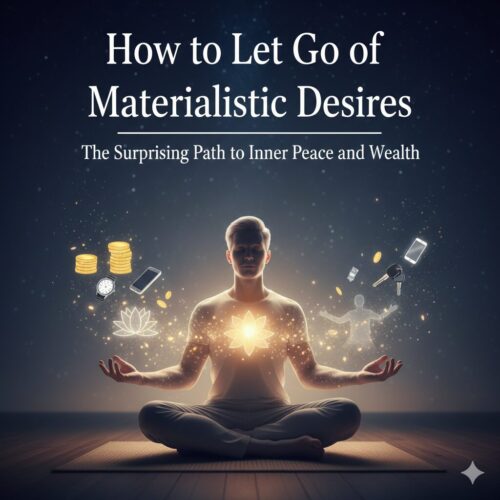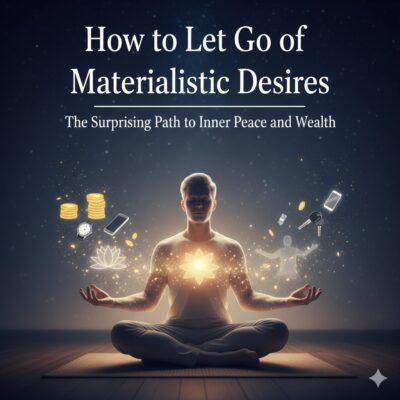Beyond Possessions: A Comprehensive Guide to the Benefits of Letting Go of Materialism
Introduction: In modern society, we’re constantly told that happiness is just one purchase away. From luxury cars to the latest gadgets, the message is clear: acquiring more is the key to a better life. But what if this promise is an illusion? What if true fulfillment lies not in what we gain, but in what we choose to release? Letting go of materialistic desires is a powerful act of self-liberation, offering a path to profound inner peace, genuine happiness, and a more meaningful existence. This article will serve as your complete guide to understanding the profound benefits of releasing attachment to material things, exposing the hidden costs of consumerism, and providing you with actionable steps to live a life rich in experiences, not possessions.
The Transformative Benefits of a Non-Materialistic Life
Embracing a lifestyle less focused on material possessions offers a host of benefits that touch every aspect of your well-being. This shift in mindset from “more is better” to “less is more” can dramatically enhance your life in ways that money can’t buy.
- Elevated Inner Well-Being and Lasting Happiness: The satisfaction from a new purchase is fleeting. The initial high of acquiring something new quickly fades, leaving you in a continuous cycle of wanting. By letting go of this cycle, you are able to cultivate a deeper, more sustainable form of happiness. This happiness comes from within, rooted in your personal growth, relationships, and a sense of purpose. When your joy is not dependent on external things, it becomes a permanent part of who you are, creating a lasting sense of contentment and self-satisfaction.
- Emotional Freedom and Reduced Stress: Materialistic obsessions are a primary source of stress and anxiety. The pressure to earn enough to buy what you want, the fear of losing your possessions, and the constant comparison to others can take a heavy toll on your mental health. Releasing these desires lifts a tremendous emotional burden. This liberation allows you to experience a state of emotional lightness and peace of mind. Without the constant need to acquire and protect, you have the freedom to simply be present and enjoy your life.
- A Deeper Connection to People and the Planet: Materialism often puts possessions before people. The time, energy, and money spent on things could be invested in building meaningful relationships. When you prioritize experiences and connections over objects, your relationships with family and friends flourish. You create memories and bonds that last a lifetime, far surpassing the fleeting satisfaction of a new gadget. Furthermore, a non-materialistic lifestyle is inherently more sustainable. By consuming less, you reduce your environmental footprint, contributing to the health of the planet and leaving a positive legacy for future generations.
The Hidden Costs of Materialistic Obsession
While the media portrays materialism as a glamorous and fulfilling path, the reality is that an obsessive focus on possessions can lead to a host of significant drawbacks. These psychological, financial, and social costs are often ignored, but they can have a devastating impact on your well-being.
- The Vicious Cycle of Discontent: The core problem with materialism is that it’s a game you can never win. The fleeting happiness from a purchase creates an insatiable desire for the next thing. This endless chase leads to emotional instability and a chronic sense of dissatisfaction. The more you have, the more you want, and the further away true contentment seems to be. This cycle is a trap that keeps you from ever finding true peace.
- Erosion of Relationships and Social Isolation: When material desires become a priority, people often take a backseat. The focus on what you own, rather than who you are, can weaken bonds with loved ones. It can create an environment of competition and judgment, where your worth is measured by your possessions. This can lead to a sense of isolation and a lack of genuine connection, leaving you feeling alone despite being surrounded by things.
- Financial Instability and Consumerism: The consumerism trap is a deep and dangerous hole. Being overly focused on material goods can lead to impulsive spending, accumulating debt, and jeopardizing your financial security. The constant pressure to buy the latest products or keep up with trends can lead to a life of financial strain, which creates stress and limits your freedom. Avoiding this pitfall requires a conscious effort to separate your sense of worth from your purchasing power.
Practical Steps to Reclaim Your Life from Materialistic Desires
If you’re feeling overwhelmed by materialistic urges, the good news is that you have the power to change. By taking intentional, practical steps, you can regain control and cultivate a mindset of contentment and gratitude.
- Cultivate Mindful Awareness: The first step is to become an observer of your own desires. When you feel the urge to buy something, pause and take a moment to reflect. Ask yourself: “Why do I want this? Will this truly make me happy in the long run?” By acknowledging these desires, you can recognize their temporary nature and prevent yourself from acting on impulse. This practice of mindful awareness is a powerful tool for self-control and emotional regulation.
- Delay Gratification and Question Necessity: The next time you want to buy something you don’t need, give yourself a cooling-off period. Put the item in an online cart and wait a day or two. Often, the initial urge will pass, and you’ll realize you didn’t need it after all. Before making any purchase, ask yourself a simple question: “Is this truly necessary?” Evaluating an item’s necessity and its alignment with your long-term goals and values can save you from a lot of unnecessary spending and clutter.
- Seek Fulfillment in Non-Material Activities: To overcome a desire for things, you must replace it with a desire for experiences. Channel your energy into hobbies, learning a new skill, or spending quality time with loved ones. Engaging in activities that don’t revolve around consumption can bring a much deeper sense of satisfaction and joy. This is a crucial step in rewiring your brain to seek fulfillment in a healthier, more meaningful way.
Embracing a Life of Purpose, Gratitude, and Well-Being

Letting go of materialism is not about deprivation; it’s about liberation. It’s about freeing yourself from a cycle of endless wanting and rediscovering what truly matters. By prioritizing inner well-being over external possessions, you open the door to a life of profound purpose, genuine happiness, and lasting fulfillment.
The journey begins with recognizing the true costs of a materialistic mindset and the incredible benefits of a non-materialistic life. It’s a journey of self-reflection, gratitude, and intentional action. By consistently applying the practices of mindful awareness, delayed gratification, and seeking fulfillment in experiences, you can transform your life from one of anxiety and dissatisfaction to one of peace and purpose.
Are you ready to let go of the things that are holding you back and embrace a life of true abundance?
